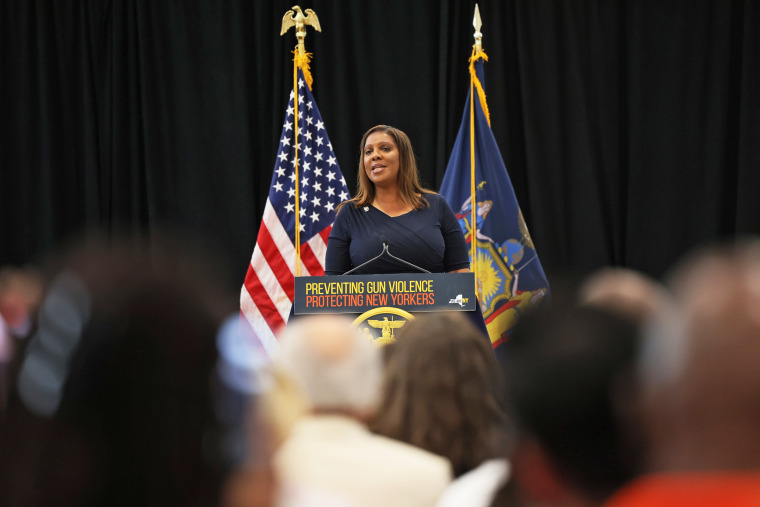A New York judge on Friday dismissed the National Rifle Association's claims that the state attorney general's investigation into allegations of widespread fraud and mismanagement at the gun group is unfair political retaliation.
The NRA had filed counterclaims seeking money damages from state Attorney General Letitia James, as well as a court order that would end her civil suit against the group.
In a 14-page ruling, State Supreme Court Justice Joel M. Cohen said the NRA had failed to put forward "any viable legal claims that the Attorney General’s investigation was unconstitutionally retaliatory or selective."
"The investigation followed reports of serious misconduct and it uncovered additional evidence that, at a bare minimum, undermines any suggestion that was a mere pretext to penalize the NRA for its constitutionally protected activities," Cohen wrote.
James celebrated the judge’s decision on social media. “Once again, a court has rejected the @NRA’s attempts to dismiss our lawsuit against the NRA for its years of fraud and abuse,” James tweeted.
The NRA's lawyer, William A. Brewer III, said they were "disappointed" in the ruling but that it would not "impact the NRA’s defense of the NYAG’s lawsuit."
James filed suit against the NRA in 2020, accusing chief executive Wayne LaPierre and other top officials of “years of illegal self-dealing” that funded a “lavish lifestyle.”
The suit alleged that the executives had used the nonprofit corporation as a “personal piggy bank,” including using millions of dollars from NRA reserves on trips and expensive meals for them and their families.
The action sought, among other things, to boot LaPierre from the group and dissolve the organization, which is the country's most powerful gun lobbyist.
The NRA denied wrongdoing and contended in court papers the action was the result of a "personal vendetta" by James, who'd referred to the group as a "criminal enterprise" and a "terrorist organization" before she was elected AG.
The judge rejected James' bid to shutter the corporation in March, finding her concerns could be addressed by other remedies, such as fines and restitution.
The NRA used Cohen's finding that dissolution was too severe a penalty to further its claims that James' probe was politically motivated.
Cohen disagreed with the reasoning.
"Although certain of the Attorney General’s claims were dismissed by the Court on legal grounds, they were serious claims based on detailed allegations of wrongdoing at the highest levels of a not-for-profit organization as to which the Attorney General has legitimate oversight responsibility. And many legally viable claims remain," Cohen wrote. "The narrative that the Attorney General’s investigation into these undeniably serious matters was nothing more than a politically motivated – and unconstitutional – witch hunt is simply not supported by the record."
The judge also pointed to inconsistencies in the group's claim that the allegations are fabricated.
"The NRA insists that the Attorney General’s investigation was 'wrongful' and 'pretextual' because it 'had undertaken a course correction to improve its compliance controls and internal governance.' In doing so, the NRA concedes that a 'course correction' was needed, undercutting its assertion that the Attorney General’s concerns were wholly fabricated. The NRA also ignores that the 'course correction' came, in part, as a response to the threat of the Attorney General’s investigation," Cohen wrote.
He noted the NRA also said in court filings it had reviewed its operations and found there were people who “had abused its trust.”
"So, while the NRA’s own internal investigation uncovered evidence of impropriety, it argues that outside investigation by the Attorney General (exercising her clear statutory authority with respect to not-for-profit corporations) somehow violated its constitutional rights," Cohen wrote.
The NRA's arguments were similar to ones made against James by former President Donald Trump last year.
Trump sued James in New York federal court in December, arguing her yearslong civil tax fraud investigation into his company should be blocked because it was “guided solely by political animus and a desire to harass, intimidate, and retaliate against a private citizen who she views as a political opponent.” The filing pointed to numerous disparaging statements James had made about Trump over the years.
A judge dismissed that suit last month after finding James' investigation had a “legitimate factual predicate.”

